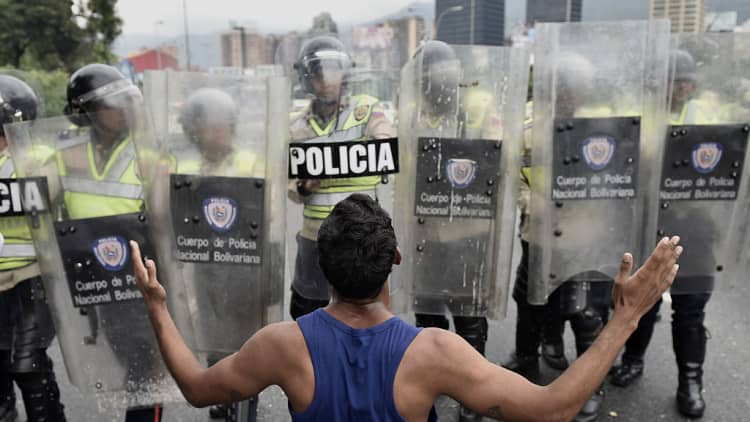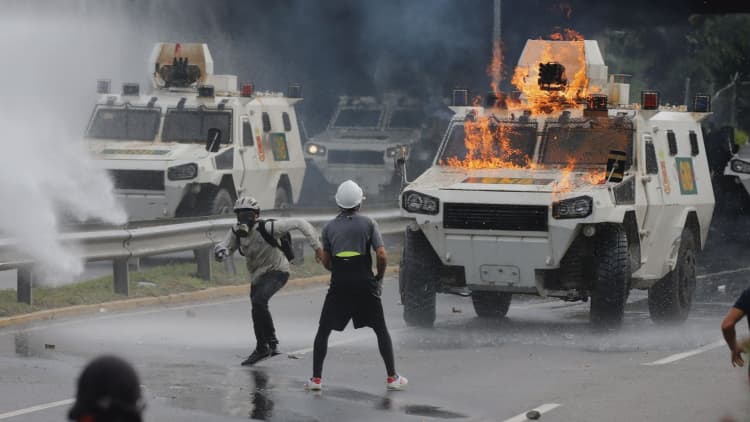
Venezuela's opposition party is refining a new weapon against the government of embattled President Nicolas Maduro: threatening that the country's lenders may not get their money back after Maduro is removed from power.
The leader of Venezuela's National Assembly, Julio Borges, criticized Goldman Sachs after the company bought the distressed debt of PDVSA, the country's state-owned oil company. Borges suggested that a future government might not honor the bonds.
The letter accuses Goldman of "making a quick buck off the suffering Venezuelan people" by helping to prop up the Maduro regime. Venezuela's government has mismanaged the country's economy, leading to severe food shortages and staggering inflation, but despite those hardships it has continued to make debt payments.
This is by no means going to dramatically change the political, economic or social dynamics on the ground.Risa Grais-TargowEurasia Group Latin America director
The repayment threats are the only leverage the opposition has right now, beyond supporting the huge street protests that have rocked the country, said Risa Grais-Targow, director of risk consultancy Eurasia Group's Latin America practice.
The opposition is trying to hasten Maduro's end by starving the government of financing and making his rule untenable.
The Development Bank of Latin America reportedly held off disbursing $440 million in loans earlier this year due to maneuvering by Venezuela's opposition-held National Assembly. Politicians refused to approve debt financing and then warned that future governments would not be obligated to pay back the money if Maduro secured the funds without assembly approval.
This shows the strategy is working, said Grais-Targow.
Goldman Sachs bought $865 million worth of the PDVSA bonds at 31 cents on the dollar, CNBC confirmed.
The bank purchased the bonds "on the secondary market from a broker and did not interact with the Venezuelan government," it said in a statement, adding, "We recognize that … Venezuela is in crisis. We agree that life there has to get better, and we made the investment in part because we believe it will."
It is not uncommon for an asset management arm to buy distressed corporate debt in that way, but the bonds were being held by the Venezuelan central bank at the time of purchase. Goldman Sachs had not been aware of that, the bank said, but that likely played into the reaction by Venezuela's opposition.
Either way, the purchase is small relative to Goldman Sachs Asset Management's total managed assets of $1.3 trillion, $40 billion of which is in emerging markets. The asset management unit itself accounts for 19 percent of Goldman Sachs revenue.

Dany Bahar, fellow at the Brookings Institution, said the bonds purchased by Goldman are "vastly undervalued."
"This is a sign of desperation from the Venezuelan government," he told CNBC, adding that a default is inevitable if the current administration remains in power.
Venezuela faces a "brutal debt service schedule," with $3.5 billion in payments coming due in October and November, noted Eurasia Group's Grais-Targow.
Staying on top of Venezuela's debt will almost certainly be the ruling party's priority, she said, though the influx of hard currency into the central bank could also fund imports and ease pressure on the state oil company, which has struggled to maintain production.
However, Goldman's bond purchase could at best help around the margins at PDVSA, said Grais-Targow. Nor is it sufficient to quell street protests.
"This is by no means going to dramatically change the political, economic or social dynamics on the ground," she said.
— CNBC's Fred Imbert contributed reporting to this story.



